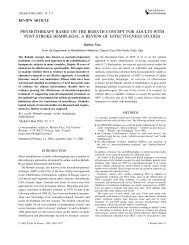<strong>the</strong> media or method through which he finally catches on <strong>to</strong> something. All goals are long-range;pupils reach <strong>the</strong>m slowly.For example, <strong>the</strong> use of music has proven <strong>to</strong> be very effective with retarded pupils, so Sundayschool teachers can apply it liberally in reinforcing lessons and as a simple <strong>to</strong>ol of instilling joy.But suppose that in teaching a song, <strong>the</strong> instruc<strong>to</strong>r notices that one little boy, Henry, substitutes aword here and <strong>the</strong>re in place of <strong>the</strong> proper verse. Should she correct him for <strong>the</strong> sake of amistaken word? Probably not. She can question <strong>to</strong> discover if <strong>the</strong> substituted words have <strong>the</strong>meaning for him which <strong>the</strong> song intends, and she may suggest that he insert <strong>the</strong> proper word. Butnever should Henry be pressured <strong>to</strong> sing <strong>the</strong> right words which might cost him <strong>the</strong> loss of <strong>the</strong>meaning of <strong>the</strong> song. It matters little that he is always proper about one or two words. Whatmatters more is that he experiences a certain kind of fulfillment through singing, and that heknows be is worshiping God in song. 25. Am I satisfied with him? The very honest teacher will put it this way: "Does <strong>the</strong> quantityand quality of Ms learning growth show that I am doing my job fully?" The teacher can answeraffirmatively and thus be satisfied with pupil progress when he has given extra effort <strong>to</strong>compensate for pupil-learning deficits.However, parents frequently show dissatisfaction with <strong>the</strong> progress of <strong>the</strong>ir retarded child,sometimes literally begging a teacher for evidence that <strong>the</strong>ir child is making great strides, and <strong>the</strong>yare puzzled when teachers seem pleased with only a little progress. Anxiety wells up withinparents when <strong>the</strong> retardate brings home schoolwork and displays it beside that done by Ms normalbro<strong>the</strong>rs and sisters. It rarely compares well, and perhaps <strong>the</strong> family uses this occasion <strong>to</strong> pick on<strong>the</strong> handicapped child. Everyone is hurt because he once again has failed <strong>to</strong> meet a standard and<strong>to</strong> gain stature in parental eyes. The child's ego is shattered, and his parents feel as though <strong>the</strong>yhave been dealt yet ano<strong>the</strong>r disappointing blow. 10When parents come <strong>to</strong> school asking why a son or daughter has not progressed in <strong>the</strong> verysimplest of things, <strong>the</strong> teacher must first be patient with <strong>the</strong>se frustrated parents. Then he mustdemonstrate that he is pleased with <strong>the</strong> child's work, that he is progressing, and how he isprogressing. The child's work will be <strong>to</strong>o imperfect for <strong>the</strong> norm of children his age, but hecannot judge this for himself. Ra<strong>the</strong>r, his family should consider his lesser accomplishments <strong>to</strong> besigns that he has begun <strong>to</strong> learn, and not that he has arrived. 11 Building <strong>the</strong> retardate's ego as wellas his ability has been <strong>the</strong> teaching goal, not that be should measure up <strong>to</strong> o<strong>the</strong>r children in <strong>the</strong>family.6. Can I set limits, <strong>the</strong>n relax and allow this person <strong>to</strong> grow? Setting limits entails twothings: establishing clear behavioral bounds, and determining <strong>the</strong> goal for a given learningexperience.Every trainable can learn obedience regarding <strong>the</strong> things he can and cannot do in <strong>the</strong>classroom. He needs continual reinforcing against forbidden behavior, whe<strong>the</strong>r it be creating classdisturbances through tantrums or by use of o<strong>the</strong>r attention-getting techniques. The teacher mustbe physically strong, firm and kind in order <strong>to</strong> gain control of his class, or <strong>the</strong>y will control him -and <strong>the</strong> idealistically conceived Sunday school class will quickly be reduced <strong>to</strong> a baby-sittingsession. The teacher sometimes finds it necessary <strong>to</strong> bodily move an unwilling child, or actuallymake him do something. Perhaps <strong>the</strong> teacher helps <strong>the</strong> child comply with a command by assistinghim. For example, after saying, "Sit down," he places <strong>the</strong> child in his seat.2 Christian educa<strong>to</strong>rs do strongly suggest that songs used in worship be those which <strong>the</strong> retarded can understand.O<strong>the</strong>rwise, much of <strong>the</strong> Sunday school's teaching purpose is lost.
Setting limits also means that a teacher sets up a frame within which <strong>the</strong> child tests his ability.This frame consists in part of <strong>the</strong> teacher's own personality, for <strong>the</strong> dependable, consistent teacherbecomes a foundation for <strong>the</strong> pupil, a structure against which he can push and pull in his struggle<strong>to</strong> grow and learn.But primarily, <strong>the</strong> "structured" 12 learning situation refers <strong>to</strong> certain tasks which aresuccessfully completed through a predetermined and precise set of instructions. Learninginstructions must always have bounds, or <strong>the</strong> mentally retarded child will constantly diverthimself, get lost and never reach a goal. For example, <strong>the</strong>re is <strong>the</strong> child who wants <strong>to</strong> begin <strong>the</strong>class "good morning" song before removing his coat. He is proceeding unacceptably, but perhapshe has not had sufficient reminding that everyone takes off his coat before class begins. The littleboy has simply patterned his own behavior before <strong>the</strong> teachers had opportunity <strong>to</strong> show him abetter way. The teacher needs <strong>to</strong> plan, <strong>the</strong>n demonstrate, and <strong>the</strong>n demonstrate again; he does notrestructure behavior in a day. Children will form <strong>the</strong>ir own approach <strong>to</strong> all of <strong>the</strong> numerousactivities which go on in a Sunday school hour. Many of <strong>the</strong>m will start out wrong and becomefrustrated unless teachers are quick <strong>to</strong> form a routine for each retardate, see that he can carry outinstructions, and <strong>the</strong>n that be actually does so. It is at this point that mentally retarded pupils canactually begin learning. Teachers may relax and trust <strong>the</strong> pupil's initiative after <strong>the</strong>y have planneda goal which be can actually reach, shown him how <strong>to</strong> do it over and over again, disciplined hisattempts by helping him not <strong>to</strong> divert or misbehave, and, finally, provided an overabundantamount of praise when <strong>the</strong> pupil succeeded.This concept of patterned, structured behavior for <strong>the</strong> retarded child is strange <strong>to</strong> someparents and teachers. As a result, <strong>the</strong> Sunday school may have <strong>to</strong> cope with <strong>the</strong> undisciplinedretardate because parents have tried <strong>to</strong> compensate for <strong>the</strong> terrible extent of <strong>the</strong> child's handicapby being permissive. However, such permissiveness only acts <strong>to</strong> inhibit <strong>the</strong> child's <strong>to</strong>tal growth,and it can never be <strong>the</strong> compensating power which <strong>the</strong> parents intended. Teachers of <strong>the</strong>retarded, like parents, must reach <strong>the</strong> point in <strong>the</strong>ir own emotional health where <strong>the</strong>y will strivewith <strong>the</strong> pupil <strong>to</strong>ward good behavior and <strong>to</strong>ward positive learning patterns.7. Have I discussed his shortcomings in front of him? This question suggests that <strong>the</strong>teacher's personal integrity plays a part in <strong>the</strong> success of his classroom efforts. It does. Theteacher's <strong>to</strong>tal character can have a negative effect upon pupils if <strong>the</strong>y detect any unsympa<strong>the</strong>tic orunspiritual quality in him. In fact, pupils pick out negative qualities much more quickly than canbe imagined, and sometimes <strong>the</strong>y pinpoint character defects which a person has not seen withinhimself. Normally, <strong>the</strong>se things are rationalized away by calling <strong>the</strong>m human weaknesses,excusable failings. More often perhaps, we should offer <strong>the</strong>se things "<strong>to</strong> God as sins <strong>to</strong> beforgiven." 13The teacher needs <strong>to</strong> develop sensitivity for <strong>the</strong> retardate's feelings at all times and in allcompany, particularly when he is present <strong>to</strong> overhear <strong>the</strong> things which are said about him.Sorneone may unintentionally belittle a child or youth with remarks about his inability in publicconversation. The retarded may have reason <strong>to</strong> doubt his teacher if he overhears an objectiveanalysis of his learning rate. Then he might begin reacting <strong>to</strong> his resulting feelings of inadequacyby withdrawing, being aggressive, showing frustration, dislike or indifference in class. 14 Perhaps<strong>the</strong> teacher praises his work each day but fails <strong>to</strong> mention <strong>the</strong>se things during <strong>the</strong> parent-teacherconferences. All of <strong>the</strong>se things work <strong>to</strong> tell <strong>the</strong> retardate that his teacher has much lessconfidence in him than he claims.
- Page 2 and 3: CONTENTSCHAPTERIntroductionPart I F
- Page 4 and 5: since three hundred mentally retard
- Page 6 and 7: probably learn those things which p
- Page 8 and 9: age forty, her chances of producing
- Page 10 and 11: Professionals are fond of telling t
- Page 12 and 13: An accurate definition of the "trai
- Page 14 and 15: Teachers can use visual materials t
- Page 16 and 17: 6. Positive reinforcement should be
- Page 18 and 19: ealize just how desperately these c
- Page 20 and 21: However, Ms teacher must deal with
- Page 22 and 23: he can perform well. A single perfo
- Page 24 and 25: pupils. Teachers must be careful to
- Page 26 and 27: in teaching trainable mentally reta
- Page 28 and 29: 9. The picture-and-question combina
- Page 30 and 31: are able to conceptualize. The auth
- Page 32 and 33: PART IISuccessful MinistryChapter 5
- Page 34 and 35: their children's handicap." He ment
- Page 36 and 37: has never been disciplined not to b
- Page 38 and 39: BUILDINGS AND EQUIPMENTThe well-pla
- Page 40 and 41: 6Who Shall Teach theMentally Retard
- Page 42 and 43: Those in special education become a
- Page 46 and 47: The teacher divests his pupil of ye
- Page 48 and 49: Can I set limits, then relax and al
- Page 50 and 51: etter lead the person in learning e
- Page 52 and 53: a way that His redeeming love is ev
- Page 54 and 55: The retarded have a low level of co
- Page 56 and 57: Most mentally retarded persons enjo
- Page 58 and 59: 8How Shall the Family Be CounseledR
- Page 60 and 61: place, attempting abortion, permiss
- Page 62 and 63: school with a neighboring family, b
- Page 64 and 65: Some will make an adequate adjustme
- Page 66 and 67: church family "has been no problem
- Page 68 and 69: criticize his every deed. Randy is
- Page 70 and 71: If there is any starting point with
- Page 72 and 73: Appendix OneHistorical Survey of Me
- Page 74 and 75: 8. Children love repetition.9. Chil
- Page 76 and 77: general intellectual functioning, (
- Page 78 and 79: SOURCE: J. V. Hottel, The Tennessee
- Page 80 and 81: 8. Ibid., p. 56.9. Ibid., p. 57.10.
- Page 82 and 83: 17. Ibid., pp. 18-22.18. Louis Rose
- Page 84 and 85: 24. Ovid. Decroly, La Classificatio
- Page 86 and 87: Cruiksbank, William M. et al. A Tea
- Page 88 and 89: Koenig, Frances. "Implications in t
- Page 90: UNESCO. Organization of Special Edu


![Successful Ministry to the Retarded[ETowns] - Elmer Towns](https://img.yumpu.com/47721906/44/500x640/successful-ministry-to-the-retardedetowns-elmer-towns.jpg)













